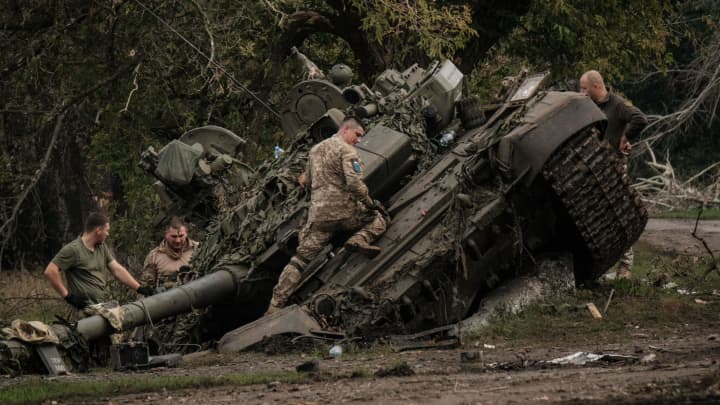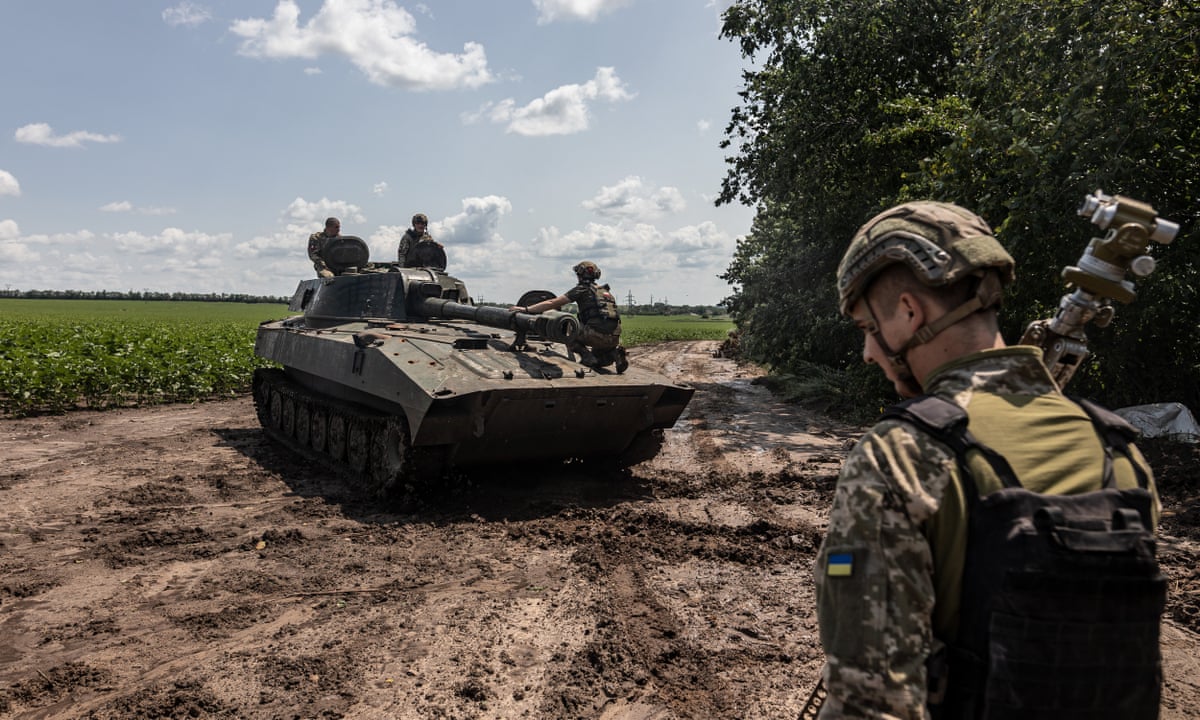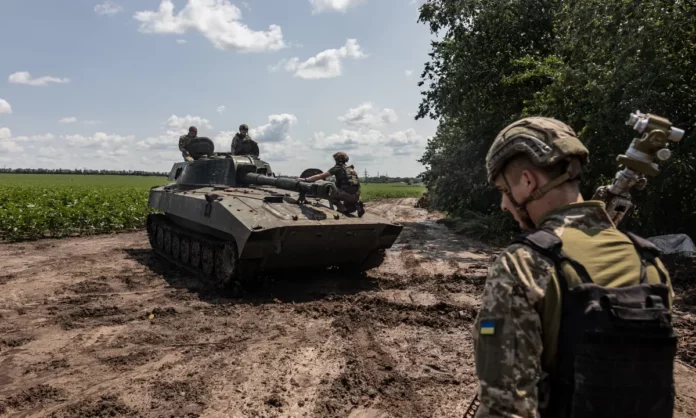War Can Be Resolved: Trump’s Bold Promise- If Elected, He Pledges to End Russia-Ukraine War within 24 Hours
This statement from Trump comes several months after he initially mentioned his ability to swiftly conclude the war.
Former US President Donald Trump has disclosed his strategy to bring an end to the Russia-Ukraine war swiftly after returning to the White House, as reported by The Independent. This revelation comes several months after he initially claimed that he could resolve the conflict within a short period of time.
During an interview with Fox News host Maria Bartiromo on “Sunday Morning Futures” on July 16, the former president was questioned about his previous assertions. He asserted that holding negotiations between Russia’s President Vladimir Putin and Ukraine’s President Volodymyr Zelensky would be a simple task due to his good relations with both leaders.
“I know Zelensky very well, I know Putin very well—even better—and I had a very good relationship with both of them,” he stated.
Mr. Trump further explained that he would convey a message to Mr. Zelensky, urging him to pursue a deal, and to Mr. Putin, warning that if no agreement is reached, substantial concessions would be granted to Ukraine. He confidently claimed that these actions would bring the war to an end.
Additionally, Mr. Trump expressed his belief that world leaders are highly intelligent individuals, taking a subtle jab at his successor, President Joe Biden, by insinuating that he lacks the capability to effectively engage with them.
“These are smart people, including (Emmanuel) Macron of France. I could go through the whole list of people, including (Vladimir) Putin… These people are sharp, tough, and generally vicious. They’re vicious, and they’re at the top of their game,” remarked Trump, before criticizing Biden. “We have a man that has no clue what’s happening. It’s the most dangerous time in the history of our country.”
When pressed for details about his specific plan, Mr. Trump praised Mr. Zelensky as being “very honorable” because “he didn’t even know what they were talking about” when questioned about the infamous July 2019 phone call between Trump and Zelensky. In that call, Mr. Trump allegedly offered a “quid pro quo” agreement, pressuring Zelensky to promote conspiracy theories about his 2020 political opponent, Mr. Biden, in exchange for US aid.
While Mr. Trump appears confident in his ability to resolve the Russia-Ukraine conflict swiftly, it is crucial to assess the feasibility and potential implications of such an approach. Diplomatic efforts to end longstanding conflicts often require intricate negotiations, cooperation from all parties involved, and a comprehensive understanding of the underlying complexities.
The Russia-Ukraine war has been a protracted and multifaceted conflict, with deep historical roots and significant geopolitical implications. Any attempt to bring about a swift resolution must consider the concerns and interests of all stakeholders, including Russia, Ukraine, and other key players in the international community.
Mr. Trump’s claim of having a good relationship with both President Putin and President Zelensky could indeed offer a potential avenue for initiating diplomatic talks. However, it is important to recognize that personal relationships between leaders may not be sufficient to address the complex geopolitical issues underlying the conflict.
Moreover, President Biden’s approach to foreign policy and international relations may differ from that of his predecessor. While it is true that leaders must navigate the intricacies of diplomacy and engage with sharp and shrewd counterparts, every administration brings its unique perspectives and strategies to the table.
Achieving a lasting and sustainable peace in the region will require a comprehensive understanding of the root causes of the conflict, an inclusive approach to negotiations, and a commitment to addressing the grievances and aspirations of all parties involved.
It is essential to consider the broader context of US-Russia relations and the implications of any potential actions taken by the US government in relation to the Russia-Ukraine conflict. Diplomatic solutions that prioritize dialogue, cooperation, and adherence to international law can contribute to easing tensions and fostering stability in the region.
Furthermore, the involvement of the international community, including organizations like the United Nations, can play a vital role in mediating and facilitating negotiations between conflicting parties.
In conclusion, while President Trump has revealed his plan to end the Russia-Ukraine war swiftly, it is important to approach this claim with a critical perspective and recognize the complexities involved in resolving such a long-standing conflict.
Diplomatic efforts that prioritize dialogue, inclusivity, and adherence to international law offer a more viable path to achieving lasting peace in the region. The Russia-Ukraine war remains a significant challenge with far-reaching implications, and it requires a multifaceted and comprehensive approach to address its root causes and pave the way for a stable and peaceful future.
Former US President Donald Trump recently disclosed his strategy to bring an end to the ongoing Russia-Ukraine war swiftly after regaining the White House, according to a report by The Independent. This revelation comes several months after his initial claim that he could resolve the conflict within a short period.
During a July 16 interview with Fox News host Maria Bartiromo on “Sunday Morning Futures,” the former president was questioned about his previous assertions. He confidently asserted that conducting negotiations between Russia’s President Vladimir Putin and Ukraine’s President Volodymyr Zelensky would be a straightforward task, citing his good relations with both leaders.
“I know Zelensky very well, I know Putin very well—even better—and I had a very good relationship with both of them,” he stated.
Mr. Trump went on to elaborate that he would communicate a message to Mr. Zelensky, urging him to pursue a deal, and to Mr. Putin, warning that if no agreement is reached, substantial concessions would be granted to Ukraine. He firmly believed that these actions would effectively bring an end to the war.
Additionally, Mr. Trump expressed his belief that world leaders are highly intelligent individuals, subtly taking a jab at his successor, President Joe Biden, by insinuating that he lacks the capability to effectively engage with them.

“These are smart people, including (Emmanuel) Macron of France. I could go through the whole list of people, including (Vladimir) Putin… These people are sharp, tough, and generally vicious. They’re vicious, and they’re at the top of their game,” remarked Trump, before criticizing Biden. “We have a man that has no clue what’s happening. It’s the most dangerous time in the history of our country.”
Despite Mr. Trump’s apparent confidence in his ability to resolve the Russia-Ukraine conflict rapidly, it is crucial to critically assess the feasibility and potential implications of such an approach. Diplomatic efforts to end longstanding conflicts often necessitate intricate negotiations, cooperation from all parties involved, and a comprehensive understanding of the underlying complexities.
The Russia-Ukraine war has been a protracted and multifaceted conflict, with deep historical roots and significant geopolitical implications. Any attempt to bring about a swift resolution must consider the concerns and interests of all stakeholders, including Russia, Ukraine, and other key players in the international community.
While Mr. Trump’s claim of having a good relationship with both President Putin and President Zelensky may offer a potential avenue for initiating diplomatic talks, it is essential to recognize that personal relationships between leaders may not be sufficient to address the complex geopolitical issues underlying the conflict.
Moreover, President Biden’s approach to foreign policy and international relations may differ from that of his predecessor. Each administration brings its unique perspectives and strategies to the table, and navigating the intricacies of diplomacy and engaging with sharp and shrewd counterparts requires careful consideration.

Achieving a lasting and sustainable peace in the region will necessitate a comprehensive understanding of the root causes of the conflict, an inclusive approach to negotiations, and a commitment to addressing the grievances and aspirations of all parties involved.
To effectively address the Russia-Ukraine conflict, it is vital to consider the broader context of US-Russia relations and the implications of any potential actions taken by the US government. Diplomatic solutions that prioritize dialogue, cooperation, and adherence to international law can contribute to easing tensions and fostering stability in the region.
Furthermore, the involvement of the international community, including organizations like the United Nations, can play a vital role in mediating and facilitating negotiations between conflicting parties.
In conclusion, while President Trump has revealed his plan to end the Russia-Ukraine war swiftly, it is essential to approach this claim with a critical perspective and recognize the complexities involved in resolving such a long-standing conflict. Diplomatic efforts that prioritize dialogue, inclusivity, and adherence to international law offer a more viable path to achieving lasting peace in the region.
The Russia-Ukraine war remains a significant challenge with far-reaching implications, and it requires a multifaceted and comprehensive approach to address its root causes and pave the way for a stable and peaceful future. While personal relationships between leaders can be valuable, they are only one aspect of a complex diplomatic process that requires careful consideration, cooperation, and engagement from all parties involved.
As the international community continues to grapple with the complexities of the Russia-Ukraine conflict, it is crucial to remain committed to diplomatic solutions that promote dialogue, uphold international law, and respect the sovereignty and territorial integrity of all nations involved.
Furthermore, the role of international organizations, such as the United Nations, in mediating and facilitating negotiations cannot be understated. These institutions play a crucial role in promoting peaceful resolutions to conflicts and fostering stability in regions affected by violence and political turmoil.

As the world continues to closely monitor the situation in the region, it is important for all stakeholders to prioritize peaceful dialogue, respect for human rights, and a commitment to finding lasting solutions that benefit all parties involved.
The road to peace may be challenging and fraught with obstacles, but with sincere efforts from all parties and the support of the international community, a path towards reconciliation and stability can be forged. The Russia-Ukraine war is a testament to the complexities of modern geopolitical conflicts, and its resolution will require a concerted and sustained effort from the global community.
In conclusion, the disclosure of President Trump’s strategy to end the Russia-Ukraine war swiftly
has garnered attention and raised questions about its feasibility and potential implications. While personal relationships between leaders can be valuable in diplomacy, they are just one aspect of a multifaceted process that requires careful consideration and engagement from all parties involved.
The Russia-Ukraine conflict is a longstanding and complex issue with deep historical roots and significant geopolitical implications. Achieving a lasting and sustainable peace will necessitate a comprehensive understanding of the root causes of the conflict, an inclusive approach to negotiations, and a commitment to addressing the grievances and aspirations of all parties involved.
Diplomatic efforts that prioritize dialogue, cooperation, and adherence to international law can contribute to easing tensions and fostering stability in the region. The involvement of the international community, including organizations like the United Nations, can play a vital role in mediating and facilitating negotiations between conflicting parties.
As the world continues to closely monitor the situation, it is important for all stakeholders to remain committed to finding peaceful and lasting solutions that benefit all parties involved. The road to peace may be challenging, but with sincere efforts and the support of the global community, a path towards reconciliation and stability can be forged.
The Russia-Ukraine war serves as a reminder of the complexities of modern geopolitical conflicts and underscores the importance of diplomatic efforts in resolving such issues. As the international community grapples with the challenges posed by this conflict, it is crucial to uphold the principles of peace, dialogue, and respect for human rights.

In the face of uncertainty and turmoil, the pursuit of peace remains a shared responsibility. By fostering an environment of trust, cooperation, and understanding, the global community can work together to build a future of stability and prosperity for all nations involved. As history has shown, diplomatic solutions are often the most effective means of resolving conflicts and promoting lasting peace in regions affected by violence and political discord.
In conclusion, the Russia-Ukraine conflict is a complex and multifaceted issue that requires a comprehensive and inclusive approach to find lasting solutions. President Trump’s strategy to end the war swiftly must be critically evaluated and weighed against the realities of the conflict.
Diplomatic efforts that prioritize dialogue, cooperation, and adherence to international law are essential in easing tensions and fostering stability in the region. The involvement of the international community, particularly organizations like the United Nations, can play a vital role in mediating and facilitating negotiations between conflicting parties.
As the world navigates the complexities of the Russia-Ukraine conflict, it is essential for all stakeholders to work together in pursuit of peace and reconciliation. By upholding the principles of diplomacy, respect for sovereignty, and commitment to human rights, the global community can pave the way towards a brighter future for the people of Ukraine and the broader region.

